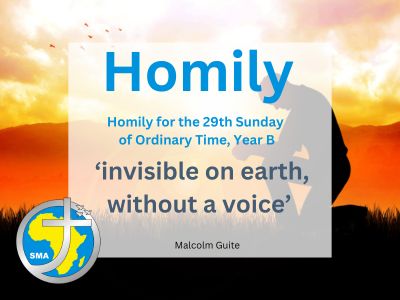Readings: Is 53:10-11; Heb 4:14-16; Mk 10:35-45
Today’s gospel reading opens with Jesus and his disciples on the road, heading for Jerusalem. Jesus has just told his disciples – for the third time! – about the fate that awaits him there: that he will be delivered into the hands of the religious and civil authorities, condemned and put to death, before rising again after three days. Clearly the disciples have neither taken to heart the words of their master nor understood its implications for themselves. Their minds are filled with dreams of earthly power and glory.
Mark tells us that the sons of Zebedee, James and John, two of Jesus’ closest apostles and friends, approach Jesus and ask him for a favour. They want him to guarantee them the highest places of honour in his coming Kingdom. Their attitude and approach to Jesus reflects the corporate mindset of today’s secular world, in which social climbers seek their own self-interest at the expense of others, and push themselves to the top by any means, fair or foul. James and John are telling Jesus what to do. We might ask ourselves if our prayers are sometimes like that – telling God what we want him to do for us instead of being open to what God wants from us.
In his response we notice that Jesus does not castigate the two brothers or express indignation at their foolish demand. Instead, with remarkable patience, he tries to open their minds to what being his followers really means. He tells them that they don’t know what they are asking. Then he asks them if they can drink the cup of suffering from which he must drink, or endure the baptism of pain and agony that he must endure. Confidently, but without any real comprehension, they reply that they can, and Jesus assures them that they will indeed be given a share in his suffering but that the dispensation of honours in his kingdom is not within his remit to grant: ‘As for seats at my right hand or my left, these are not mine to grant; they belong to those to whom they have been allotted’ (Mk 10:40).
Overhearing the conversation between Jesus and the two brothers, the other apostles are furious, not because they are any less ambitious, but because they have been upstaged by James and John. So Jesus calls all the twelve together for a much-needed lesson about power and authority. Painstakingly, he explains the difference between the common understanding of authority, exemplified by ‘the pagans’, their Roman colonisers, and the exercise of authority in his kingdom. ‘You know that among the pagans their so-called rulers lord it over them, and their great men make their authority felt. This must not happen among you (Mk 10: 42).
Roman authority, as the disciples of Jesus were well aware, was exercised primarily through force, intimidation, and a network of patronage, that sought to ensure absolute loyalty to the Emperor. This ruthless exercise of power has no place in the Kingdom Jesus is establishing. In the kingdom of God power and leadership are manifested in the service of others: ‘Anyone who wants to become great among you must be your servant, and anyone who wants to be first among you must be slave of all’ (Mk 10: 43-44). Jesus himself is the living embodiment, the perfect model, of this kind of leadership. He is the humble, suffering servant, depicted by Isaiah in the first reading today, whose innocent suffering brings healing to others: ‘By his sufferings shall my servant justify many, taking their faults on himself’ (Is 53:11) He is the supreme high priest who, as our second reading from the Letter to the Hebrews tells us, took on himself our human weakness and identified himself with us in every way except sin (cf. Heb 4:15).
The values of Jesus are profoundly counter-cultural and diametrically opposed to the worldly lust for power and status, which, as Pope Francis frequently reminds us, can be found sadly within the Church at every level. The message of today’s gospel is as relevant to our time as it was in the time of Jesus. As members of Christ’s body, the Church, we are all called to be counter-cultural witnesses to God’s reign of justice, peace and love. We are challenged to resist the insidious attractions of fame and prestige and imitate the kind of servant leadership of Jesus, who gave ‘his life as a ransom for many’ (Mk 10:45). It is in this way that we become great in God’s eyes. This kind of service does not need be accompanied by heroic deeds or spectacular gestures. We find multiple examples of it all around us, in our parishes and communities, in little unrecorded and unremembered acts of kindness and love. It is a service provided by persons we often overlook, ‘invisible on earth, without a voice’, as Malcolm Guite reminds us in his poem The Last Beatitude, with which I shall conclude this homily:
And blessed are the ones we overlook;
The faithful servers on the coffee rota,
The ones who hold no candle, bell or book
But keep the books and tally up the quota,
The gentle souls who come to “do the flowers”
The quiet ones who organise the fête.
Church sitters who give up their weekday hours,
Doorkeepers who may open heaven’s gate.
God knows the depths that often go unspoken
Amongst the shy, the quiet, and the kind,
Or the slow healing of a heart long broken
Placing each flower so, for a year’s mind.
Invisible on earth, without a voice,
In heaven their angels glory and rejoice.
Listen to the audio variation:

